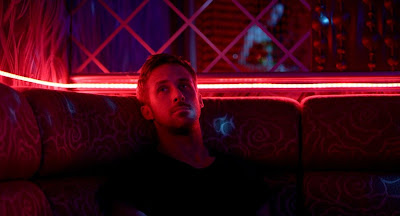One of my favourite things about The Conjuring is that there are no cynics. There's no token asshole who exists just to sneer and say "There's no such thing as ghosts, doofus!" so the story can justify why they don't just say "Yeah, alright" when the ghost tells them to fuck off. The tormented family of The Conjuring can't bail, because their finances are tied to the house. They didn't know about the series of murders before their arrival because Rhode Island state law prohibits realtors from releasing that information. But more importantly, when the calm, level-headed man of the house sees and hears genuine terror from his daughter, he gets the Ghostbusters in whip-fucking-smart. And it's those Ghostbusters that this movie's actually about. Did you know that back in the 70s there were two rock-star demonologists named the Warrens, one of whom was the only Vatican-certified exorcist to not be ordained, who checked out the Amityville house? Yeah, me neither. This flick is loosely based on their real experiences with a family tormented by a scraggy old dead woman and her prankster dead son. It's a genius move that I'm surprised to have not seen in more horror movies: if we come to know and care for the superheroes and they start to get scared, what does that say about the evil they're up against?
I fucking love horror. It's one of, if not my favourite genres of film and as such, it's also the genre I'm most snobbish about. Paranormal Activity (hear me out) didn't scare me when the ghost accidentally ran into a wall and decided to make the sound resonate so it would seem intentional. Paranormal Activity did scare the shit out of me when the female protagonist was ripped out of her bed and dragged down the hallway screaming and clawing at the floor, trying to escape the unseen entity. Of course, fear is 100% subjective, and I'm totally aware that some people find the Mr. Magoo Ghost really very spooky, and that's fine, but for me, it's not scary, but startling. Real horror isn't switching the lights off when I'm walking down a hallway, jumping in front of my face and shouting "FUCKIN' BOO WAAARRGHHH." Real horror is presenting me with an image so astonishing, so terrifying, so...horrific even, that I can't jump at it, because I'm frozen in fear. Those are the images that get under my skin and prevent me from sleeping. And The Conjuring got me fucking good a few times. I'm not going to spoil the fun, but there's a scene involving a game of hide and seek and another involving laundry that gave me chills and have been burned into my brain. The smartest thing Wan does here is employ the best trick in the horror book - sometimes, something is scarier the less you see of it - and takes it one step further: sometimes, something is scarier when you don't see it at all. Many scenes employ a beautiful level of restraint and silence, so that rather than keep you jumping and filled with anxiety, it may keep you frozen and filled with dread. Take note: this is what makes a horror movie memorable.
Next to the scares, the two most integral elements to a horror flick are characters and camera. In Halloween, the relationship Laurie shares with her friends feels real, not overblown and full of stereotypes, which makes it all the more tense and harrowing when these likable people start falling prey to Michael Myers. In The Conjuring, there's no suburban drama bubbling under the surface of paradise or suppressed familial hatred that jeopardises their safety in a time of peril. This is a large family that loves each other very much, being protected by a husband and wife that exude warmth and affection, and it's these attributes that makes the scary things happening to them all the more scary. As for the cinematography, holy shit. You can ask the person I saw this with: I squealed when a long zoom tracking shot was used. John R. Leonetti deserves a massive cuddle for shooting a film that understands the power and potential for terror that grace and stillness can provide. Just like Insidious too, his eye for framing is unbelievable as well, lending as much weight to the film's most terrifying shots as the monsters themselves. Clapping hands will make you shit yourself.
So, in case it's not yet apparent, I really, really dug The Conjuring. There's a few things I haven't yet praised it for, such as its balls to the wall awesome soundtrack (The Zombies and Ryan Gosling's music project Dead Man's Bones? FUCK!), its almost total lack of CGI (read my Evil Dead review if you haven't yet for a rundown on my love for practical effects), its location (somehow, the location scouts found a spooky as hell old American home, with a twisted up dead tree and a black lake out back), and its loving nods to Poltergeist (including the TV static and two goofy characters that show up to help the exorcists), but ultimately, that's just sprinkles on the ice cream. All up, it's a beautiful, restrained, scary-as-all fuck tribute to the great horror films of the 70s and 80s, and in a world where a studio will make millions from Paranormal Activity 18: Loud Noises and...I Don't Know, Fuck You, it's nice to see they can make just as much from a real movie. Thank fuck for James Wan.






















